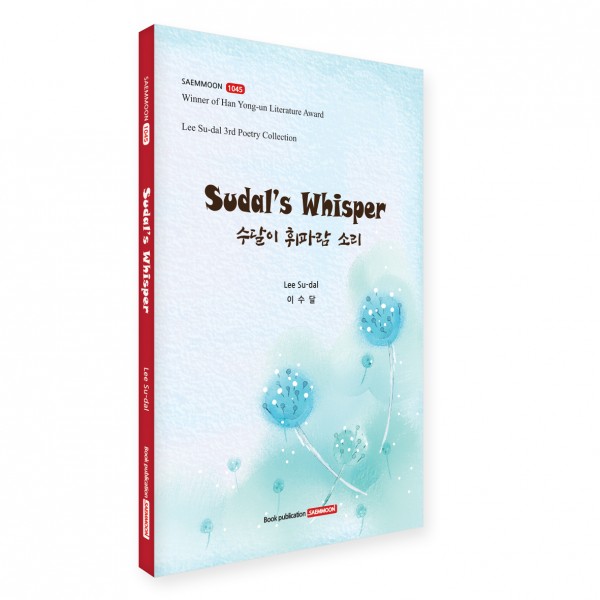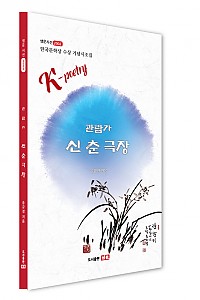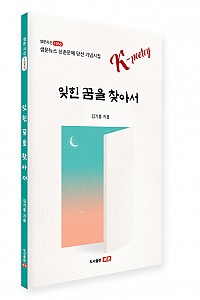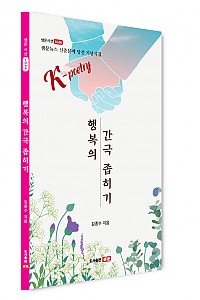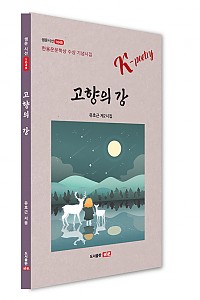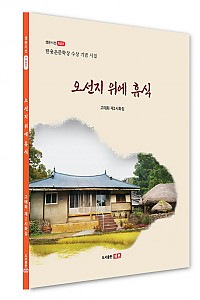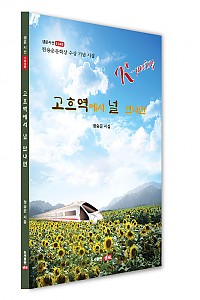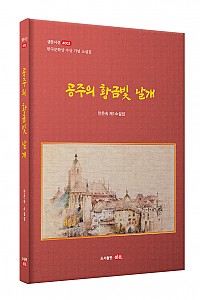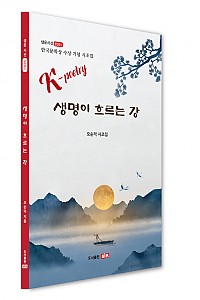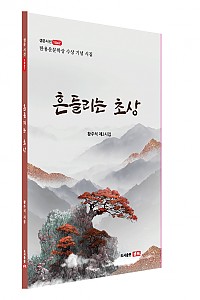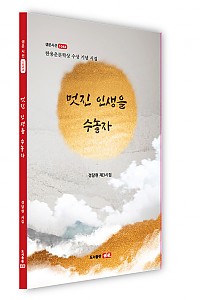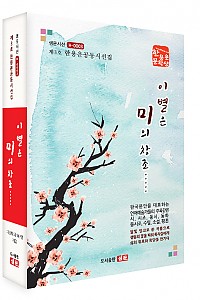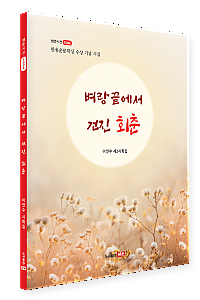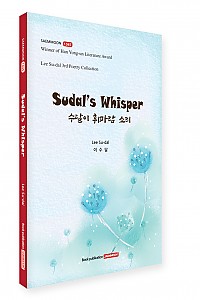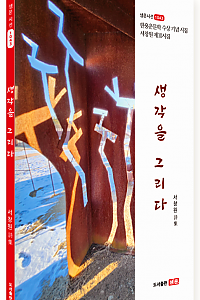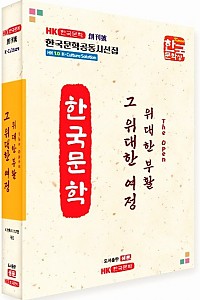◇목차
Sudal’s Whisper/ 수달이 휘파람 소리
이수달 제3시집(한영시집)
여는 글 ········································································· 4
Writer’s Words ······························································· 6
평설 ················································································ 8
Poetry of Emotional Sympathy and Positivism ············· 15
제1부, 물밥 치세
Part 1 Rice in the Peaceful Land
제1부 물밥 치세
Part 1 Rice in the Peaceful Land
능소화 여인 30
The Trumpet Creeper Lady
삶의 찬가 32
The Paean of Life
물밥 치세治世 34
Rice in the Peaceful Land
여름 손님, 매미 36
The Summer Guest, Cicada
손수건 38
Handkerchief
낙엽 40
The Foliage
이불 42
Blanket
무룡산아 동천강아 44
Muryong Mountain, Dongcheon River
맞아 죽을 상상 46
A Dangerous Thought
옥정호 48
Lake Okjeong
서글픈 새해 50
A Moody New Year
겨울비 52
The Winter Rain
냉이국 54
Shepherd’s Purse Soup
여운과 아쉬움의 철학 56
The Philosophy of Resonance and Regret
삶을 여미며 58
Adjusting the Jacket of Life
해장국 60
Haejangguk
흑마술酒 62
The Drink of Dark Magic
음주학 개론 64
Discipline of Drinking 101
단추 66
Button
자화상 68
Self Portrait
제2부, 연달래 필 때쯤
Part 2 When the Royal Azalea Blooms
개나리 소녀 72
The Forsythia Girl
가지산의 봄 74
Spring in Gaji Moutain
세월가世越歌 76
Ode to Time
구름 78
Cloud
얼굴 80
Face
꿈 82
Dream
빈민촌 84
Slum
스템프 운동 86
Stamp Workout
마누라 88
Wife
사랑 90
Love
연달래 필 때쯤 92
When the Royal Azalea Blooms
구름 94
Cloud
제비집 96
A Swallow’s Nest
동병상련 98
Sympathy
수화림 100
Soohwarim
행복한 저녁 식사 102
A Contented Dinner Table
선각자, 여성노동자 104
Pioneers, Working Women
처세 106
The Philosophy of Living
어머니 108
Mother
바다는 어미라 부른다 110
The Sea Calls it Mother
잠자리의 교만 112
The Arrogance of a Dragonfly
제3부, 너럭바위 연가
Part 3 Love Song of a Broad Rock
우체통 116
The Postbox
가을날 서정 118
Lyrics of Autumn
야생 동물 120
Wild Animal
폐백상 122
Pyebaek
국밥 124
Gukbap
고목나무 126
The Old Tree
당신의 명절 128
A Holiday For You
삶 130
홍시 132
Ripe Persimmon
너럭바위 연가 134
Love Song of a Broad Rock
친구표 사과 136
Apples From My Friend
첫눈 138
First Snow
책갈피 140
Bookmark
한 해를 보내며 142
Closing the Year
별들의 이별 144
Farewell of the Stars
황당한 꿈 146
A Nonsense Dream
정표 148
Token
부부싸움 150
Lovers’ quarrel
봄맞이 152
Spring Greeting
개구리 합창 154
Frog Choir
제4부, 수달이 휘파람 소리
Part 4 Sudal’s Whisper
점빵 158
Corner Store
봄 병어 160
Spring Butterfish
양보 162
Yielding
봄날 망상妄想 164
Spring Delusions
수달이 휘파람 소리 166
Sudal’s Whisper
결혼 날 168
Wedding Day
노동의 생각 170
The Thought of Labor
애기 염소 172
A Baby Goat
옷걸이 못 174
A Hanger Nail
호국영령의 달, 유월 176
June, the Month of Memorial
눈 뜬 봉사의 삶 178
Life of a Blind
한여름 180
Midsummer
늙은 노동자 182
An Old Laborer
사색 184
Meditation
아내의 휴가 186
Wife on a Holiday
신발 188
Shoes
-----------------------------------------
<시인 소개>
프로필
이수달 시인
시인, 수필가
아호 : 죽파竹波
울산광역시 출생
울산광역시 거주
(사)샘문그룹 이사
(사)문학그룹샘문 이사
(사)샘문그룹문인협회 이사
(사)샘문학(구,샘터문학) 이사
(사)한용운문학 회원
(주)한국문학 회원
(사)샘문뉴스 회원
샘문시선 회원
<수상>
한용운문학상(중견부문)
샘터문학상 본상 특별작품상
공감문학 본상(자유시)
공감문학 시부문 등단
<저서/시집>
태화강 연가
거목은 별이 되었네
수달이 휘파람 소리(한영시집)
<공저>
바람을 연모하는 꽃
리라꽃 그늘 아래서
태초의 새벽처럼 아름다운 사랑
추야몽 秋夜夢
나 그렇게 당신을 사랑합니다 외 다수
<샘문시선>
-----------------------------
<여는 글>
여름이면 냇가에 멱감고
족대 들고 버들치, 송사리 잡고
뛰놀던 그 냇가는 그대로 건만
고향에 풍경은 시대의 흐름을 타고
옛것은 흔적 없이 사라져 버리거나
오염이 되어버린 황토 흙더미와
물줄기만 흐르고 있습니다.
소싯적 주말이나
방학 때가 되면 저녁을 먹고
희미한 십 촉짜리 전등 아래
소설책 한 권을 폈다면
그 책은 그날 밤 다 읽어보고
잠을 청하고,
그다음 날 새벽에 산업현장으로 나가
피땀 흘리는 날들이 많았습니다.
지금 돌이켜보면
그때 그 시절이 있었기에
지금의 선진국으로 발돋움한
오늘의 대한민국이 있지 않나
생각합니다.
학창 시절 읽었던 책 중
기억에 남는 책은
헤밍웨이의 노인과 바다라는
한영판 소설집을 탐독하였습니다.
그 책 속에는 노인이 배를 타고
바다에 나가 고기를 잡아서
뱃전에 달고 오는 과정에서
잡은 고기가 상어에게 뜯어 먹히는
과정에서
노인의 심상을 담은 적나라한 이야기를
책갈피 속에 담은 감명 깊은
내용이었습니다.
본 한영시집을 펴내면서
저나 독자들에 어학 능력에도
많은 도움이 되었으면 하는
마음이 간절합니다.
저에 한영판 시집 “수달이 휘파람 소리”를 펴내면서 많은 지도편달과 감수를 해주시느라 많은 시간을 고생하신 샘문시선에 지율 이정록 교수님께 고개 숙여 감사의 말씀을 올립니다.
그리고 샘문시선에 편집위원님들과
출판위원님들, 영문으로 번역해주신
번역가님, 평설을 해주신 손해일 문학박사님께도
감사의 말씀을 올립니다.
끝으로 저의 곁에서 항상 응원을 아끼지 않는
저의 사랑하는 가족들과 이 출간의 기쁨을 같이합니다.
또한 저를 아시는 모든 문인 여러분들과 친구들,
지인님들께도 감사의 말씀을 전합니다.
한영판 이수달 제3시집 “수달이 휘파람 소리”에 많은
관심과 사랑을 부탁드립니다.
여러분 감사합니다.
2023. 07. 17.
죽파 이 수 달 드림
Writer’s Words
The stream that I waded through,
where I used to catch minnow as a boy,
remains unchanged.
Yet, the scenery of my hometown,
along with the current of time,
has lost its antiquity.
Polluted clay and water flow in its place.
As a young man,
I would eat my evening meal
and open up a page of a novel
under the faint light.
I would finish the last line of the book
and cuddle in my covers.
At dawn, I would walk to industrial sites,
where I sweated my sweat of youth.
As I look back,
that was the time
when Korea made great advancements
and stepped up to be
what it is today.
As a school boy,
I would indulge myself with books.
Among all, ‘The Old Man and the Sea’
(English/Korean translated version)
by Hemingway captured my heart.
The old man sailed out to sea
and caught a fish.
While he sailed back home,
a shark gnawed off the fish that was
hanging on the side of the boat.
The book frankly talks about
the old man’s feelings,
which left me a strong impression.
Printing a translated poetry collection,
I wish with all my heart
that it could help the readers
to adopt the English language.
I send my word of gratitude to
Professor Jiyul, Lee Jeong-rok
for devoting his time
to supervise and guide me through
the publication of <Sudal’s Whisper>.
Also, I would like to express my
sincere thanks to the editing team of
Saemmoon, to the translator,
and Doctor Son Hae-il for the critic.
Last but not least, a special word for my loving family who support me at always.
I wish to share this joy with you.
Thank you to my fellow writers,
friends, and all my close acquaintances.
Please send your support and love towards my 3rd poetry collection, <Sudal’s Whisper> Thank you, everyone.
2023. 07. 17.
Sincerely, Jukpa Lee Su-dal
-----------------------------
<평설>
대상과의 정서적 교감과 긍정의 시학
- 손해일(시인, 문학박사, 교수, PEN 제35대 이사장)
[1] 머리말
이수달 시인의 제3시집 ????수달이 휘파람 소리???? 발간을 진심으로 축하드린다. 특히 이번 시집은 한·영 대역 작품집이라 국제적 소통에도 한 걸음 다가섰다는 데에 의의가 있다. 시집 제목이 이수달 시인의 이름을 음차한 ????수달이 휘파람 소리????라 재미있다. 이번 시집의 특징은 대다수 작품들이 자연 또는 생활 속의 시적 대상과 알레고리적 의인화를 통해 교감하며 감정이입을 하고 있다는 점이다. 문학작품을 “작가의 거울”이라고 할 때 이 시집은 전반적으로 긍정적, 희망적인 기조를 보이고 있다.
시창작 기법을 ‘말하기’와 ‘보여주기’로 대별 할 때, 이번 작품들은 ‘말하기’ 기법이 대부분이며, 짧고 난해하지 않아 쉽게 읽힌다. 이번 시집에는 77편의 작품을 “물밥치세” “연달래 필 무렵” “너럭바위 연가” “수달이 휘파람 소리” 등 4부로 나누고 있다.
[2] 시적 대상과의 정서적 교감과 감정이입
시적 대상과의 정서적 교감은 알레고리Allegory를 통해서 이루어진다. 알레고리는 우유愚喩, 우의寓意 풍유諷諭라고도 불리는데 인물, 행위 배경 등을 일차적 표면적 의미와 이차적 이면적 의미를 갖도록 의인화해 넌지시 감정이입을 하는 것이다. ????이솝우화????가 대표적이다. 다음 시 「능소화 여인」을 보자
달 젖가슴처럼/ 촉촉한 그대 입술에/ 내 입술 포개고 싶다//
미치도록 가녀린 꽃대에/ 주렁주렁 열린 꽃숭어리/
교태를 부리는데/그녀가 간절히 기다리는/
무릉화원에서 영원히 살고 싶은데/
짝사랑하는 날 받아줄까!//
- <능소화 여인> 전문
화자는 능소화를 여인으로 상정해 소통하며 감정이입을 하고 있다. 일차적으로 능소화는 꽃이지만 이차적으로는 짝사랑의 여인이다. “달 젖가슴처럼 촉촉한 입술”을 가졌으며, “가녀린 꽃대에 주렁주렁 열린 꽃숭어리가 교태를 부린다.” 화자는 이 여인과 무릉화원에서 영원히 살고 싶은데 짝사랑을 받아줄까? 반문한다.
여름 손님이/ 목소리 높이는 계절/ 그녀는 여름 전령사지//
땡볕을 녹이는 존재 중에/ 그녀만큼 목소리 높은/
신비로운 목소리가 또 있을까!//
그녀 소리 따라/ 여름 알곡이 익어간다네!//
- <여름 손님, 매미> 일부
여름 손님인 매미 “그녀는 여름 전령사”이다. “땡볕을 녹이는 존재 중에 그녀만큼 신비로운 목소리가 또 있을까?” “그녀 소리 따라 여름 알곡이 익어간다”고 상찬한다. 매미를 여인으로 알레고리로 의인화하여 소통하고 있다.
피었네, 피었어/ 노란 꽃, 개나리꽃 피었네//
철모르는 어린 소녀같이/ 노란 꽃을 피웠네//
소설小雪이 오늘인데/ 철없는 저 아이를 어찌해야 하노//
밤새 얼음 속에서/ 여린 노란 꽃잎 어찌 지낼까!//
- <개나리 소녀> 일부
「개나리 소녀」 역시 개나리를 소녀로 의인화한 알레고리 적 기법이다. 노란 개나리가 하필 소설小雪인 오늘 같은 추운 날에 철부지 소녀처럼 피었다고 걱정하는 내용이다. “철없는 저 아이를 어찌해야 하노?” “밤새 추운데 얼음 속에서 노란 꽃잎은 어찌 지낼까!”
하얀 눈 녹은 자리에/ 파란 냉이가//
봄 여인 냉이가 왔네요/ 새파란 냉이가//
아직 두툼한 겨울옷을/ 입고 있네//
한 포기 두 포기, 안아서/ 그녀의 상큼한 향을 느끼고//
푹 익은 된장에 그녀와 섞어/ 보글보글 끓여서//
내 깊은 심연에/ 그녀를 맞이하고 싶네//
- <냉이국> 일부
「냉이국」에서는 냉이를 ‘봄 여인’으로 의인화하고 있다. 하얀 눈 녹은 자리에 ‘푸른 냉이 여인’이 왔는데 아직 두툼한 겨울옷을 입은 그녀를 안아서 상큼한 향을 느낀다. “푹 익은 된장에 그녀와 섞어” 냉이국을 끓여서 “내 심연에 그녀를 맞이하고 싶네”라고 한다.
가지산 초봄에/ 조개 산 만나서 바람피웠나?//
슬픈 신불산이/ 눈물 흘리고//
천운天雲이 놀라워/ 부채질 다급多急하니/
설원雪原이 휘날리며/ 겨울 동산冬山으로 위로하네//
- <가지산의 봄> 전문
가지산에 봄이 오면 슬픈 신불산이 눈물 흘리는데, 가지산이 바람피워서 그런가 의심한다. 가지산을 달래려고 하늘 구름이 다급히 부채질하니 눈 언덕이 휘날리며 겨울산으로 위로한다. 가지산, 신불산, 천운, 설원, 겨울 동산이 모두 감정을 가진 개체들로 비유한다.
성난 파도는/ 험상궂은 얼굴에 깊게 파인/ 어버이 주름살//
잔잔한 바닷소리는/ 따뜻한 어버이 얼굴//
넓디넓은 바다는/ 어버이 마음이 펼쳐진 곳이라//
부딪치는 파도 소리/ 가족 행복 나누는 웃음꽃이라//
내가 외롭고 쓸쓸할 때/ 한없이 안아주고 보듬어준 그대//
바로 그대가 가슴 뚫어 주는/ 망망대해 바다//
아픔과 슬픔을 어루만져 주는 바다/
그대를 어버이라 간절히 부른다//
- <바다는 어미라 부른다> 전문
이 작품에서는 바다를 우의적으로 인간에 비유하고 있다. “성난 파도는 어버이 주름살” “바닷소리는 어버이 얼굴” “넓은 바다는 어버이 마음” “파도 소리는 웃음꽃”이다. 내가 외롭고 쓸쓸할 때 나를 안아주고 아픔과 슬픔을 어루만져 주기에 바다를 어버이라 간절히 부른다는 것이다.
지금도 그 성녀가/ 생각이 난다//
어제 본 감나무가 잎은 없는데/ 바싹 몸이 붉게 달아올라//
달달한 알몸뚱이로/ 대롱거리는 그녀의 교태가/
자꾸만 아롱거린다//쳐다만 보고 왔는데/
까치가 그녀를 범하기 전에/ 따 먹고 싶다//
- <홍시> 전문
홍시는 ‘성녀聖女로 의인화된다. 잎이 다 떨어진 감나무에 매달려 붉고 달달한 알몸둥이로 교태를 부리는 그녀(홍시)가 자꾸만 눈에 어른거린다. “까치가 그녀를 범하기 전에/ 따먹고 싶다”는 게 화자의 독백이다.
[3] 긍정적 세태풍자와 언어유희
이수달 시인은 생활 주변의 사물을 소재로 간간이 세태풍자와 언어유희를 한다. 세태풍자는 신랄하게 사회현상을 비판하는 게 상례이지만, 이 시집에서는 온건하고 긍정적이다. 언어유희는 fun이라고도 하며 일종의 말장난인데, 골계미와 유머를 구사하는데 유용한 방법이다.
이런 류 작품은 「삶의 찬가」 「물밥 치세」 「이불」 「맞아 죽을 상상」 「삶을 여미며」 「세월가」 「스탬프 운동」 「마누라」 「행복한 저녁 식사」 「선각자, 여성 노동자」 「어머니」 「폐백상」 「당신의 명절」 「한 해를 보내며」 「눈깔사탕」 「양보」 「노동의 생각」 「늙은 노동자」 등이다. 이 중 몇 편을 살펴본다.
친구에게 시비를 걸면/ 술병이 따라오고//
술병에 시비를 걸면/ 술잔이 따라오고//
술잔에 시비를 걸면/ 젓가락이 따라오고//
젓가락에 시비를 걸면/ 안주가 따라오고//
안주에 시비를 걸면/ 따귀가 따라온다//
-<음주학 개론> 전문
「음주학 개론」은 우리의 술 문화를 소재로 풍자시를 쓴 것이다. 술을 소재로 마치 끝말잇기 놀이처럼 친구와 시비하는 것으로 시작해서 술병―술잔―젓가락―안주―따귀로 마무리 짓는다. 술좌석의 보편적 현상이다
이 별이 너의 별이냐/ 저 별이 너의 별이냐//
동쪽에서 서쪽으로/ 가는 저 별은 이별인가?//
새해에 뜨는 별/ 동지섣달 지난 그믐날//
낡은 달과 별님이/ 이별하고// 새해 맞아/ 새별, 새달 맞아야 겠네//
- <별들의 이별> 전문
제목은 「별들의 이별」인데 “이 별이 너의 별이냐” “저 별이 너의 별이냐”로 시작하는 이 작품은 ‘이별’과 ‘이 별’의 언어유희로 전개하지만, 결국은 새해를 맞아서는 낡은 것과 이별하고 ‘새별’ ‘새달’을 맞아야겠다는 긍정적 결말로 마무리한다.
노랑 빨강 파랑 무지개 색깔이/ 올망졸망 질서가 아름다워//
집 찾아가는 순서도/ 위에서 아래 아래에서 위로/
중간에 집 찾기는 어려워//배꼽 앞 한 녀석이 가출하면/
동네방네 이 잡듯이 수색해//가출한 녀석 못 찾으면/
붕어빵처럼 생긴 녀석 데려다가/ 양자로 들이지//
- <단추> 일부
「단추」는 ‘단추’를 의인화한 세태풍자시이다. 알록달록한 무지개 색깔에다 위아래로 올망졸망 매달린 질서가 아름답다. 그러다 배꼽 단추 한 녀석이 가출하면 “동네방네 이 잡듯이 수색하고“ 그래도 못 찾으면 그 단추를 대신하여 붕어빵처럼 닮은 녀석 하나 데려다가 양자로 들인다는 내용이다.
도시 꼭대기에 / 땅거미가 내리깔려/ 가로등이 산길 따라 등반하네//
배고파 울먹이는 어린아이 달래는/ 엄마 목소리에 삶의 고달픔이 묻어나네//졸고 있는 가로등 아래/ 온기 품은 소나기/
구린 알코올 냄새 풍기며 낡은 신발 적시고//
내일 새벽 일터 갈 생각에/ 육신 눕힐 자리 찾아 비틀대는 발길 바빠지니/ 반달이 쪽방촌 길을 밝히네//
-<빈민촌> 일부
이 시는 도시빈민촌 쪽방촌의 고단한 일상을 그린 작품이다. 이수달 시인이 자신의 일상에서 쪽방촌 빈민의 고단한 삶으로 사회적 관심이 확장돠고 있음을 나타내는 작품이다.
“배고파 울먹이는 어린아이 달래는/ 엄마 목소리에 삶의 고달픔이 묻어난다”
아침에 눈 뜨면/아, 살아 있구나!//
밤의 정령들에게/ 살려줘서 감사하고//
나 자신에게는/ 살아있어서 감사하고//
오늘도 정염의 불꽃 지펴 보세/ 생령의 텃밭 가꾸어 보세//
그대와 나에게 행복을 주는/ 삶을 살아보세//
충만한 황혼이 아름다운/ 그날을 위해 아낌없이//
- <삶의 찬가> 전문
이 작품은 이수달 시인의 긍적적 인생관이 잘 나타난 작품이다. 아침에 눈 뜨면 살아있게 해준 밤의 정령들에게 감사하고, 살아있는 나 자신에게 감사한다. 보람있는 오늘과 미래를 위해 너와 나에게 행복을 주는 삶을 살아보자고 권유한다. “충만한 황혼이 아름다운 / 그날을 위해 아낌없이”
빈손으로 왔다가 맨몸으로/ 돌아가는 인생길//
서로서로 이해하고 보살피고/ 도와가며 웃으면서 살아보자//
즐겁게 살아도/ 짧디짧은 인생살이라네//
아웅다웅 겨울 한파 속에/ 얼어붙은 인상은 볼썽사납다네//
봄날 따뜻한 온기 따라/ 나무에 물이 오르고/
꽃봉오리 움틀 때//내 인생살이도/ 다시 어깨를 편다네//
- <삶을 여미며> 전문
「삶을 여미며」는 위에서 살펴본 「삶의 찬가」와 일맥상통하는 작품이다. 이수달 시인의 성품과 긍정적, 희망적 인생관이 드러난 작품이다. ‘공수래공수거’인 허무한 인생살이에 서로 이해하고 도와가며 웃으면서 살자. 즐겁게 살아도 짧은 인생인데, 아웅다웅 다투면서 살지 말자. 나무에 물오르고 꽃 피는 봄이 오면 내 인생도 다시 어깨를 편다는 긍적적 메시지이다.
세월이 너무 빨라서/ 누가 좀 잡아주면 좋을 텐데//...../
하루하루 보람된 삶을 위해/ 긍정적인 사고로 열심히 살아보세//
생각이 건전하고 생활이 건전하면/ 인생이 바뀐다는 사실을//
긍정적으로 하루 시작하면/ 즐거운 하루가 될 걸세//
- <세월가> 일부
긴 설명은 생략하지민 앞에 살펴본 두 작품에서 드러난 이수달 시인의 인생관과 긍정적 성품을 재확인 시켜주는 작품이다.
[4] 맺는말
이상에서 이수달 시인의 한영대역 제3시집 ????수달이 휘파람 소리????의 작품 세계를 살펴보았다. 첫 번째 특징은 이미지 만들기보다는 ‘말하기’에 치중함으로써 짧고 쉽게 읽힌다는 점이다. 두 번째 특징은 시적 대상 즉 ‘객관적 상관물’을 알레고리로 의인화해서 감정이입을 한다는 접이다. 세 번째 특징은 사회현상 쪽으로 관심을 돌려 세태풍자를 하는 경우에도 신랄한 비판보다는 긍정적, 희망적인 시각으로 한다는 점이다. 간간이 언어유희로 유머를 구사하기도 한다. 이 시집을 계기로 이수달 시인의 시 세계가 더욱 발전하고 진경 있기를 기대한다, 시인의 한영판 제3시집 출간을 진심으로 감축드린다.
<Critic>
Poetry of Emotional Sympathy and Positivism
- Son Hae-il(Poet, Doctor of Literature, Professor, 35th Chief Director of PEN)
[1] Preface
Congratulations on the publication of Lee Su-dal’s 3rd poetry collection, <Sudal’s Whisper>. This collection, published in Korean and English translations, has an exceptional significance of taking one step towards a global communication. The title, <Sudal’s Whisper>, is brought directly from the poet’s name, creating a humor. A distinguished feature of this collection is that most poems are arousing a sense of sympathy with the nature or everyday poetic objects, and using allegorical personification to empathize with the subjects. Given that a literary work is ‘the poet’s reflection,’ it can be said that the overall mood of this collection is positive and hopeful.
If we divide the poetic techniques into two groups, ‘spoken’ and ‘shown,’ this collection consists mostly of ‘spoken’ poems. Lee Su-dal’s works are short, up-to-point, and readable. The collection is subdivided into four parts, “Rice in the Peaceful Land,” “When the Royal Azalea Blooms,” “Love Song of a Broad Rock,” and “Sudal’s Whisper.”
[2] The Sense of Sympathy and Empathy with the Poetic Objects
A sense of sympathy is aroused through the poetic technique of ‘Allegory.’ Allegory, a type of a metaphor, is a personification method which gives an object a secondary meaning underneath its surface meaning. <Aesop’s Fables> is a typical example of an allegory. Let’s take a look at Lee Su-dal’s <The Trumpet Creeper Lady>.
Your lips are/ as moist as the breast of the Moon/ I wish to lay my lips on yours//
The thin flower stalk/ bears full buds/ playing the coquette/
want to live in the ripe garden/ where she desperately waits for me/ Will she accept my unrequited love?//
- <The Trumpet Creeper Lady>
Here, the narrator presumes the trumpet creeper to be a lady and deeply sympathizes with it. On the surface level, a trumpet creeper is a flower. On the secondary level, it is a lady whom the narrator loves, with “lips as moist as the breast of the Moon,” and whose “thin flower stalk bears full buds, playing the coquette.” The narrator asks a question, whether the lady will accept his unrequited love and longing to live with her in the ripe garden.
The season of the summer guest/ raising her voice/ She’s the messenger of summer//
Who else, melting the scorching sun/ has a high pitch like hers?/ Whose voice is as wondrous as hers?//
Along with her voice/ the summer grains ripen//
- From <The Summer Guest, Cicada>
The poet compares the cicada to the “messenger of summer,” and praises her, “who else, melting the scorching sun has a high pitch like hers?” “Along with her voice, the summer grains ripen.” He is personifying the cicada as a woman, communicating through another allegory.
Bloom, oh bloom/ The yellow forsythia blooms//
Like a young, innocent girl/ Blooms its yellow flower//
Looks like the first snow today/ What should I do with that thoughtless girl?//
How will the young, yellow flower/ bear the frosty night?//
- From <The Forsythia Girl>
<The Forsythia Girl> is another allegory personifying a forsythia flower as a girl. The poet worries about the yellow forsythia which blooms on the cold day of first snow, like an innocent girl. “What should I do with that thoughtless girl?” “How will the young, yellow flower bear the frosty night?”
Where the white snow melted/ A blue shepherd’s purse has arrived//
The lady of spring has come/ A blue shepherd’s purse//
Still wearing/ the thick winter’s clothes//
One blade, two blades, hold her in my arms/ to feel her fresh scent//
Mix her with ripe dwenjang/ and simmer it gently on the heat//
Into my deep abyss/ I welcome the lady of spring//
- From <Shepherd’s Purse Soup>
In <Shepherd’s Purse Soup>, the poet personifies shepherd’s purse as the ‘lady of spring.’ Where the white snow melted, ‘a blue shepherd’s purse’ has come, and the narrator holds the lady in thick winter clothes in his arms, feeling her fresh scent. “Mix her with ripe dwenjang” to cook shepherd’s purse soup and “into my deep abyss, I welcome the lady of spring.”
The early spring of Gaji Mountain/ Did you have an affair with Jogae Mountain?// The sorrowful Shinbul Mountain/ Drops its mournful tears//
The agitated clouds/ need urgent cooling down/ That’s when the snowflakes flutter/ Soothing them with the winter mountain//
- <Spring in Gaji Mountain>
When spring arrives in Gaji Mountain, the sorrowful Shinbul Mountain drops its tears, suspecting Gaji Mountain’s affair with Jogae Mountain. The clouds comfort Gaji Mountain with the wind, snowflakes, and the winter mountain. Here, all subjects; Gaji Mountain, Shinbul Mountain, clouds, snowflakes, and winter mountain, possess emotions like human.
The furious waves/ are deep wrinkles/ on my mother’s face//
The calm sound of sea/ is the warmth of my mother’s face//
The wide, wide sea/ is my mother’s heart spread out//
The sound of crashing waves/ is the laughter of joy I share with my family//
When I was lonely and sad/ you held and embraced me//
You bring fresh air to my frustrated heart/ You are a boundless ocean//
You stroke my pain and sorrow/ I heartily call you, my mother
- <The Sea Calls it Mother>
In <The Sea Calls in Mother>, the poet compares the sea to a human. “The furious waves are deep wrinkles on my mother’s face.” “The calm sound of sea is the warmth of my mother’s face.” “The wide, wide sea is my mother’s heart spread out.” “The sound of crashing waves is the laughter of joy I share with my family.” When the narrator was lonely and sad, the sea held and embraced him in its arms. Therefore, the narrator is heartily calling the sea ‘mother.’
The saint’s face/ lingers in my mind//
The bare persimmon tree I met yesterday/ Blushing hot with a scarlet face//
The sweet body/ Her coquette of hanging on the tree/ Shimmers in front of my eyes//
I could do nothing but to look at her/ But before the magpie steals her/ How I wish to pick her!//
- <Ripe Persimmon>
Here, a ripe persimmon is personified as a ‘saint.’ The persimmon, hanging on the bare tree, tempts the narrator with a red, sweet body. And the scene lingers in the narrator’s mind. It is the narrator’s monologue that he “wishes to pick her before the magpie steals her.”
[3] Optimistic Satire of Society and Pun
On top of that, Lee Su-dal utilizes satires and puns using ordinary, every-day objects. A satire usually criticizes the society sharply, but those used in this poetry collection is rather moderate and optimistic. Another literary device found throughout the collection is a pun. It is an effective device to create both a satire and humor.
Examples of such poems are <The Paean of Life>, <Rice in the Peaceful Land>, <Blanket>, <A Dangerous Thought>, <Adjusting the Jacket of Life>, <Ode to Time>, <Stamp Workout>, <Wife>, <A Contented Dinner Table>, <Pioneers, Working Women>, <Mother>, <Pyebaek>, <A Holiday For You>, <Closing the Year>, <Corner Store>, <Yielding>, <The Thought of Labor>, and <An Old Laborer>, etc. Let’s look through some of them.
Pick a quarrel with a friend/ And a bottle returns//
Pick a quarrel with the bottle/ And a glass returns//
Pick a quarrel with the glass/ A pair of chopsticks returns//
Pick a quarrel with the chopsticks/ Appetizers return//
Pick a quarrel with the appetizers/ A slap on the cheek returns//
- <Dicipline of Drinking 101>
<Dicipline of Drinking 101> is a satire about Koreans’ drinking culture. Like a game of word chain, it starts with quarreling with a friend, and continues on to bottle-glass- chopsticks-appetizers-and a slap on the cheek, which is a common scene of drinking in Korea.
Is this star yours/ Or is that star yours?//
The star moving from east to west/ Is it the farewell star?//
The star that floats on new year’s day/
On the last day of the month//
The old moon and stars/ say good-bye to one another//
Welcoming the new year/ Greeting new stars and moon//
- <Farewell of the Stars>
<Farewell of the Stars> begins with asking a question, “Is this star yours? Or is that star yours?” The poem itself is a pun, as the Korean word ‘Yi-byeol’ has two meanings; ‘farewell’ and ‘this star.’ The conclusion of this poem is to say farewell to the old things and welcome the ‘new star,’ ‘new day,’ which shows the poet’s optimism.
Yellow, red, blue, rainbow/ Huddled together in a beautiful order//
The order of returning home/ From top to bottom, bottom to top/ It’s hard to find the way home//
When one child runs away from home/ I search everywhere in the neighborhood//
If lost forever/ I find another child, like two peas in a pod/ and adopt him as my son//
- From <Button>
<Button> is a satirical poem that personifies ‘buttons.’ The rainbow colors are huddled together in a beautiful order. When one of the buttons runs away from home, the narrator searches “everywhere in the neighborhood.” If lost forever, he finds another child and adopt it as a new child.
On top of the city/ the dusk fell/ Streetlight climbs along the mountain path//
When a child cries in hunger/ The mother’s calming voice sounds exhausted//
Underneath that resting streetlight/ The warmth in the shower of rain/ The scent of alcohol wets the old shoes//
Waiting for another labor in the morning/ Busy footsteps look for a place to rest/ The half moon lights up the path of the slum//
- From <Slum>
<Slum> is a poem that portrays a tiring day of a slum. It depicts how Lee Su-dal, the poet, expands his interest from his own life to the life of the poor living in a slum.
“When a child cries in hunger/ The mother’s calming voice sounds exhausted.”
When I awake in the morning/ Yes, I’m alive!//
I thank the spirits of night/ for giving me another day//
I thank myself/ for surviving another night//
Let’s light a fire of passion again/ Let’s tend the garden of life//
Let’s live a life/ that gives happiness to you and me//
Till the day of abundant twilight/ Let’s not waste today//
- <The Paean of Life>
<The Paean of Life> represents poet Lee Su-dal’s optimistic view of life. He thanks the spirits of night for giving him another day. And he invites the readers to live a life that gives happiness to you and me. “Till the day of abundant twilight/ Let’s not waste today.”
Life is about coming with bare hands/ and returning with a bare body//
Let’s understand and care for one another/ Let’s help and smile along//
Life is too short/ just to enjoy//
In the cold wave/ A frosty face is unsightly//
When spring brings warmth along/ and trees draw up water/ When flower buds bloom//
My life will once again/ broaden its shoulders up//
- <Adjusting the Jacket of Life>
<Adjusting the Jacket of Life> is written in line with <The Paean of Life>. It shows Lee Su-dal’s optimistic and hopeful view of life. Though life is about ‘coming empty and returning empty,’ the poet invites us to understand and help each other. The message is that since life is so short, we should not quarrel, but enjoy our life. It says that when spring brings warmth, and trees draw up water, our life broadens its shoulders, too.
The time is so fast/ Someone, please seize the time/....../
To live a fruitful life/ Let’s fill our day with a positive mind//
Positive thoughts and positive actions/ can definitely change our lives//
Start your day with a bright smile/ and it will be a joyful day//
- From <Ode to Time>
<Ode to Time> is another work of Lee Su-dal which confirms his view of life and optimistic character.
[4] Conclusion
So far, we walked through the outlook on Lee Su-dal’s 3rd poetry collection, <Sudal’s Whisper>. The first distinct character of this collection is that it focuses on ‘spoken’ poems that are short and readable. Second, it creates a sense of sympathy with the poetic objects through allegory and personification. Third, it includes satire of the society, but does it in a positive, hopeful manner rather than sharp critics. I send my sincere hope for poet Lee Su-dal that the publication of <Sudal’s Whisper> could help him advance more and broaden his world as a poet. Again, congratulations on issuing the 3rd poetry collection.
| 제품소재 | 상세설명페이지 참고 |
|---|---|
| 색상 | 상세설명페이지 참고 |
| 치수 | 상세설명페이지 참고 |
| 제조자 | 상세설명페이지 참고 |
| 세탁방법 및 취급시 주의사항 | 상세설명페이지 참고 |
| 제조연월 | 상세설명페이지 참고 |
| 품질보증기준 | 상세설명페이지 참고 |
| A/S 책임자와 전화번호 | 상세설명페이지 참고 |
| 재화 등의 배송방법에 관한 정보 | 상품 상세설명페이지 참고 |
|---|---|
| 주문 이후 예상되는 배송기간 | 상품 상세설명페이지 참고 |
| 제품하자가 아닌 소비자의 단순변심, 착오구매에 따른 청약철회 시 소비자가 부담하는 반품비용 등에 관한 정보 | 배송ㆍ교환ㆍ반품 상세설명페이지 참고 |
| 제품하자가 아닌 소비자의 단순변심, 착오구매에 따른 청약철회가 불가능한 경우 그 구체적 사유와 근거 | 배송ㆍ교환ㆍ반품 상세설명페이지 참고 |
| 재화등의 교환ㆍ반품ㆍ보증 조건 및 품질보증 기준 | 소비자분쟁해결기준(공정거래위원회 고시) 및 관계법령에 따릅니다. |
| 재화등의 A/S 관련 전화번호 | 상품 상세설명페이지 참고 |
| 대금을 환불받기 위한 방법과 환불이 지연될 경우 지연에 따른 배상금을 지급받을 수 있다는 사실 및 배상금 지급의 구체적 조건 및 절차 | 배송ㆍ교환ㆍ반품 상세설명페이지 참고 |
| 소비자피해보상의 처리, 재화등에 대한 불만처리 및 소비자와 사업자 사이의 분쟁처리에 관한 사항 | 소비자분쟁해결기준(공정거래위원회 고시) 및 관계법령에 따릅니다. |
| 거래에 관한 약관의 내용 또는 확인할 수 있는 방법 | 상품 상세설명페이지 및 페이지 하단의 이용약관 링크를 통해 확인할 수 있습니다. |
- 단순 변심인 경우 : 상품 수령 후 7일 이내 신청
- 상품 불량/오배송인 경우 : 상품 수령 후 3개월 이내, 혹은 그 사실을 알게 된 이후 30일 이내 반품 신청 가능
| 반품사유 | 반품 배송비 부담자 |
|---|---|
| 단순변심 | 고객 부담이며, 최초 배송비를 포함해 왕복 배송비가 발생합니다. 또한, 도서/산간지역이거나 설치 상품을 반품하는 경우에는 배송비가 추가될 수 있습니다. |
| 고객 부담이 아닙니다. |
| 진행 상태 | 결제완료 | 상품준비중 | 배송지시/배송중/배송완료 |
|---|---|---|---|
| 어떤 상태 | 주문 내역 확인 전 | 상품 발송 준비 중 | 상품이 택배사로 이미 발송 됨 |
| 환불 | 즉시환불 | 구매취소 의사전달 → 발송중지 → 환불 | 반품회수 → 반품상품 확인 → 환불 |
- 결제완료 또는 배송상품은 1:1 문의에 취소신청해 주셔야 합니다.
- 특정 상품의 경우 취소 수수료가 부과될 수 있습니다.
| 결제수단 | 환불시점 | 환불방법 |
|---|---|---|
| 신용카드 | 취소완료 후, 3~5일 내 카드사 승인취소(영업일 기준) | 신용카드 승인취소 |
| 계좌이체 |
실시간 계좌이체 또는 무통장입금 취소완료 후, 입력하신 환불계좌로 1~2일 내 환불금액 입금(영업일 기준) |
계좌입금 |
| 휴대폰 결제 |
당일 구매내역 취소시 취소 완료 후, 6시간 이내 승인취소 전월 구매내역 취소시 취소 완료 후, 1~2일 내 환불계좌로 입금(영업일 기준) |
당일취소 : 휴대폰 결제 승인취소 익월취소 : 계좌입금 |
| 포인트 | 취소 완료 후, 당일 포인트 적립 | 환불 포인트 적립 |
- 단순변심으로 인한 반품 시, 배송 완료 후 7일이 지나면 취소/반품 신청이 접수되지 않습니다.
- 주문/제작 상품의 경우, 상품의 제작이 이미 진행된 경우에는 취소가 불가합니다.
- 구성품을 분실하였거나 취급 부주의로 인한 파손/고장/오염된 경우에는 취소/반품이 제한됩니다.
- 제조사의 사정 (신모델 출시 등) 및 부품 가격변동 등에 의해 가격이 변동될 수 있으며, 이로 인한 반품 및 가격보상은 불가합니다.
- 뷰티 상품 이용 시 트러블(알러지, 붉은 반점, 가려움, 따가움)이 발생하는 경우 진료 확인서 및 소견서 등을 증빙하면 환불이 가능하지만 이 경우, 제반 비용은 고객님께서 부담하셔야 합니다.
- 각 상품별로 아래와 같은 사유로 취소/반품이 제한 될 수 있습니다.
| 상품군 | 취소/반품 불가사유 |
|---|---|
| 의류/잡화/수입명품 | 상품의 택(TAG) 제거/라벨 및 상품 훼손으로 상품의 가치가 현저히 감소된 경우 |
| 계절상품/식품/화장품 | 고객님의 사용, 시간경과, 일부 소비에 의하여 상품의 가치가 현저히 감소한 경우 |
| 가전/설치상품 | 전자제품 특성 상, 정품 스티커가 제거되었거나 설치 또는 사용 이후에 단순변심인 경우, 액정화면이 부착된 상품의 전원을 켠 경우 (상품불량으로 인한 교환/반품은 AS센터의 불량 판정을 받아야 합니다.) |
| 자동차용품 | 상품을 개봉하여 장착한 이후 단순변심의 경우 |
| CD/DVD/GAME/BOOK등 | 복제가 가능한 상품의 포장 등을 훼손한 경우 |
| 상품의 시리얼 넘버 유출로 내장된 소프트웨어의 가치가 감소한 경우 | |
| 노트북, 테스크탑 PC 등 | 홀로그램 등을 분리, 분실, 훼손하여 상품의 가치가 현저히 감소하여 재판매가 불가할 경우 |


